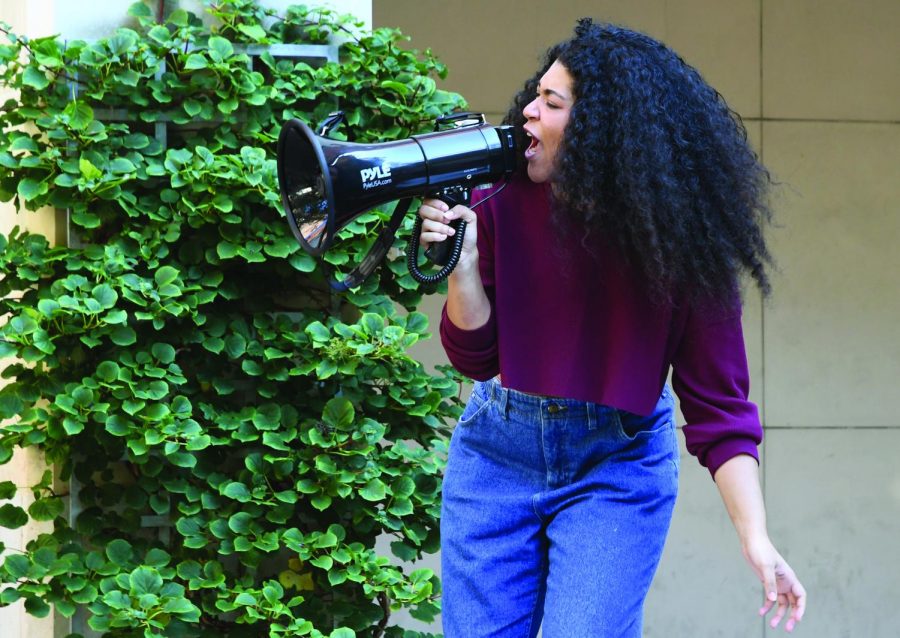Students hold rally, speak against inaction to sexual assault
Demonstration spawned in response to Justice Kavanaugh confirmation
October 9, 2018
An impromptu rally drew dozens of listeners and stories of sexual assault to Village Park on Monday.
It started with a post on Facebook. Mia Sterbini, a sophomore acting major, sent a message out to friends on a Conservatory for the Performing Arts page, calling it a “Rally Against Complacency and to Support Sexual Assault Survivors.”
What started out as a three-speaker lineup drew several more speakers who told stories of being personally assaulted, read poetry and urged fellow students to vote.
Sterbini said she never suspected the rally to gain as much traction as it did.
Sterbini said the rally could be summed up in one word: Powerful. She explained that by voicing their stories, they were bringing truth to light, and that the truth was power.
Daniel Murphy, a senior acting major, felt similarly about change that can come from sexual assault survivors sharing their stories.
“When survivors speak out, it empowers others to speak out, and the more people authentically speaking about things that happened in their lives, the more people that listen and change gets made,” Murphy said.
The rally was organized in the wake of the confirmation of Justice Brett Kavanaugh to the United States Supreme Court.
Multiple sexual assault allegations against Kavanaugh surfaced during his confirmation process, putting his appointment to the highest court in jeopardy.
After a week-long FBI investigation, Kavanaugh was confirmed following a vote of 51-49 in the senate.
Several of the speakers at the rally cited Kavanaugh’s confirmation as a call to
action.
Shouts of “What do we want?” by Sterbini were met with the response “Justice!” by the crowd.
Murphy was pleased with the turnout of the event, citing a sense of community between all that attended.
“It was really exciting to see so many artists; especially young students, new students [and] freshmen; angry, ready to share their stories [and] ready to listen,” Murphy said. “It was nice to see the community coming together, and it was exciting to see the deans watching as well.”
Dean Paylo observed a portion of the rally, but declined to comment.
Rafael Figueroa, a sophomore musical theater major, addressed the crowd and described an encounter he had with a man he met on the gay networking app Grindr.
Figueroa said the man picked him up, drove him to the lowest level of a parking garage and began clearing out the backseat of his car when a gun fell out of his pocket. Figueroa looked at the gun, then back at the man.
“If you get in the backseat, and you just go along with me, then nothing will happen,” Figueroa recalled the assaulter saying.
Figueroa said the man took off his pants and told Figueroa to have sex with him. Then, when driving back to campus, the assaulter locked the doors and said he wouldn’t let Figueroa leave until they had exchanged phone numbers.
At first, Figueroa only felt numb. He cried himself to sleep. He said he didn’t know it was rape because he wasn’t grabbed or physically forced to do anything.
“I was the one doing it, because I was afraid,” Figueroa said.
Days later, he received a message on Facebook from a fellow student. The student said he’d received nude pictures of Figueroa from the assaulter. Figueroa decided to take it up with the Title IX office.
In describing the situation to the Title IX coordinators, it was the first time Figueroa realized he was raped. He took the situation to law enforcement, but was told they couldn’t press charges without proof of an assault.
He complained further that, despite help from Title IX and outside law enforcement, the “revenge porn” law was narrow enough that it allowed a one-time encounter to disseminate images without consent.
“They said the revenge porn law didn’t apply because I wasn’t a partner of his. Like, I was not in a relationship with him,” Figueroa said. “It was just really disheartening.”
Figueroa didn’t sign up to speak beforehand. But after watching other people speak, he raised his hand and told Sterbini he wanted to share his story.
Figueroa said his purpose in sharing his story was to help people who feel they can’t speak about their experiences and to motivate people.
“The reason that I couldn’t get justice is because of the people in office. Because those people decided it’s not worth having this law apply to everyone,” Figueroa said.
The law – officially called “unlawful dissemination of intimate image” – says, “A person commits the offense of unlawful dissemination of intimate image if, with intent to harass, annoy or alarm a current or former sexual or intimate partner, the person disseminates a visual depiction of the current or former sexual or intimate partner in a state of nudity or engaged in sexual conduct.”
For Figueroa, the big takeaway from the event was to listen to survivors.
“It’s okay to realize things later, and people should believe you,” Figueroa said of his own experience. “Why would anyone make that up that they were sexually assaulted? And if they do, that’s awful.”


















